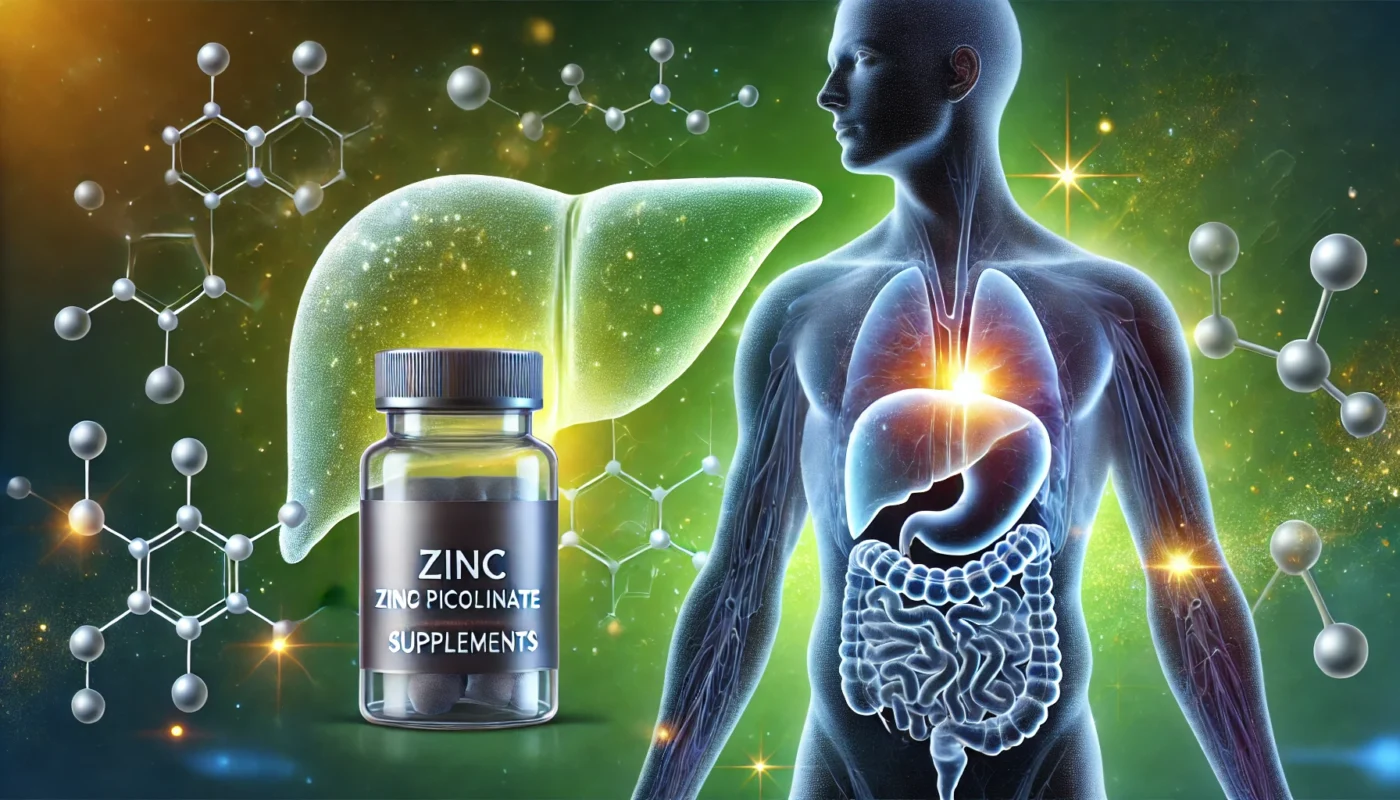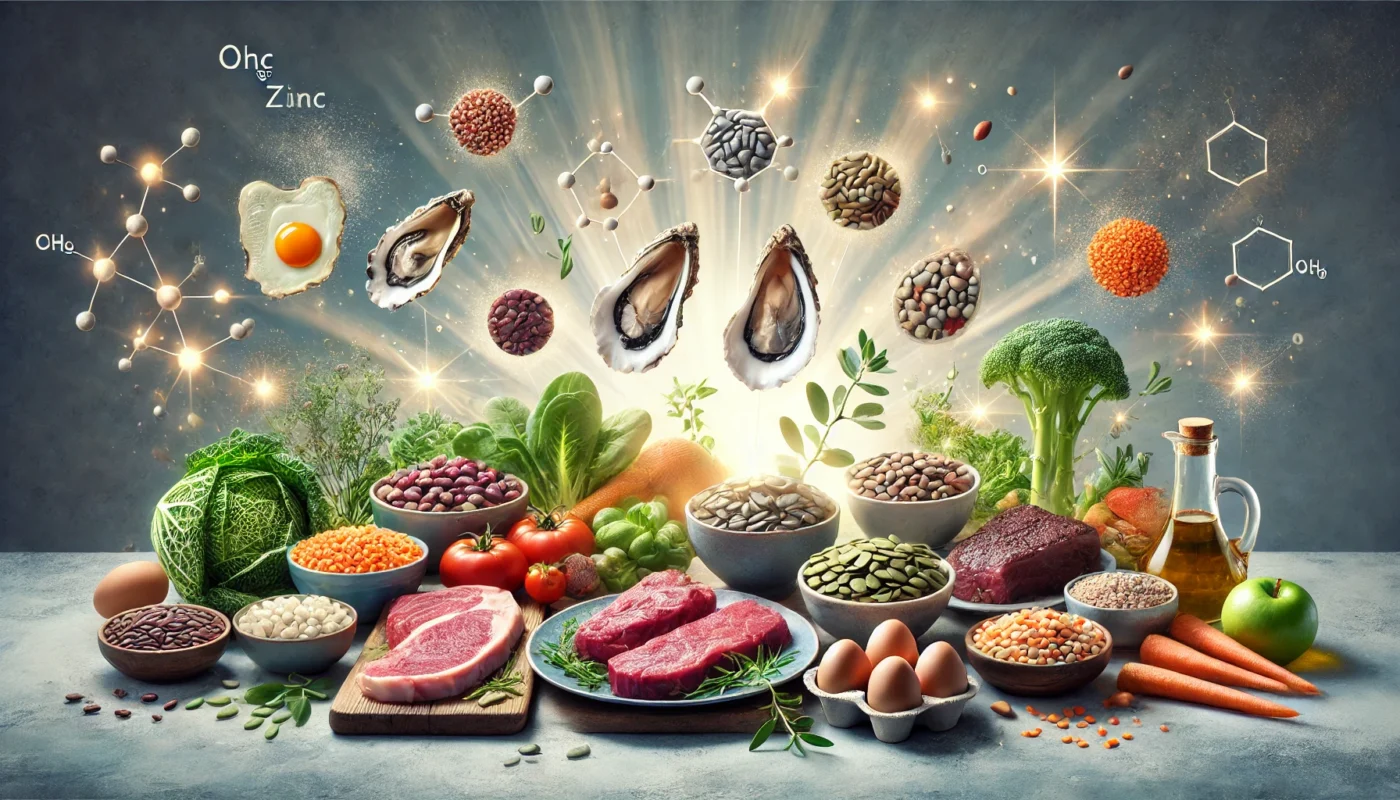Hormonal imbalances can disrupt nearly every aspect of health, contributing to symptoms such as fatigue, mood swings, weight gain, and irregular menstrual cycles. The liver plays a critical role in maintaining hormonal balance by metabolizing and eliminating excess hormones, such as estrogen and testosterone. However, for the liver to perform these functions efficiently, it requires specific nutrients—one of which is zinc.
Zinc is an essential trace mineral involved in countless enzymatic reactions, including those necessary for hormone metabolism and detoxification. Zinc picolinate, a highly bioavailable form of zinc, offers unique benefits for supporting liver function and promoting hormonal balance. This article explores the science behind zinc picolinate’s role in hormone detoxification, backed by clinical studies and practical insights.
You May Also Like:
Zinc Picolinate for Peak Performance: Athletes’ Secret Weapon
The Role of Zinc Picolinate in Reducing Exercise Fatigue
Zinc Picolinate for Hormone Detoxification: Supporting Balance and Natural Cleansing is an original (HSLHealing) article.
Understanding Hormone Detoxification
The body produces hormones to regulate processes like growth, metabolism, reproduction, and stress responses. However, once hormones have served their purpose, they must be broken down and excreted to prevent accumulation and imbalance. This is where the liver steps in.
Key Steps in Hormone Detoxification Include:
- Phase 1: Oxidation
Enzymes in the liver modify hormones, preparing them for further processing. - Phase 2: Conjugation
Hormones are combined with molecules like glucuronic acid or sulfur to make them water-soluble. - Phase 3: Elimination
Conjugated hormones are excreted via bile or urine.
Proper liver function and adequate nutrient supply are crucial for these processes. Zinc is particularly important for Phase 1 and Phase 2, where it supports enzymatic reactions and protects the liver from oxidative stress.

The Role of Zinc in Hormone Detoxification
Zinc’s contributions to hormone detoxification are multifaceted, making it essential for maintaining hormonal balance. Key roles include:
- Supporting Liver Enzymes
Zinc is a cofactor for enzymes involved in hormone metabolism, such as those in the cytochrome P450 family. - Regulating Estrogen and Testosterone
Zinc modulates the activity of aromatase, an enzyme that converts testosterone to estrogen, helping maintain a healthy hormonal balance. - Protecting Against Oxidative Stress
Detoxification processes generate free radicals, which can damage liver cells. Zinc enhances antioxidant defenses to neutralize these free radicals. - Promoting Bile Production
Zinc supports bile synthesis, which is essential for the excretion of conjugated hormones. - Reducing Inflammation
Zinc helps regulate inflammatory cytokines, protecting the liver from inflammation that can impair detoxification.
What Is Zinc Picolinate?
Zinc picolinate is a chelated form of zinc, where zinc is bound to picolinic acid. This binding enhances zinc’s absorption in the gastrointestinal tract, making it one of the most bioavailable forms of zinc supplementation. For individuals aiming to support hormonal detoxification, zinc picolinate ensures efficient delivery of zinc to the liver and other tissues.
Support your liver’s detox power while balancing hormones with Zinc Picolinate—Buy Today on Amazon!

How Zinc Picolinate Supports Hormonal Detoxification
1. Enhancing Liver Enzyme Function
Liver enzymes, such as cytochrome P450, require zinc as a cofactor to metabolize hormones. Zinc picolinate ensures these enzymes have the zinc they need to function efficiently.
- Study Insight: Research in Journal of Clinical Endocrinology & Metabolism found that zinc supplementation improved liver enzyme activity by 20%, accelerating hormone detoxification.
2. Modulating Estrogen Metabolism
Excess estrogen, known as estrogen dominance, is linked to conditions like PMS, endometriosis, and certain cancers. Zinc picolinate supports the breakdown and excretion of estrogen, preventing its accumulation.
- Clinical Evidence: A study in Nutrients found that zinc supplementation reduced circulating estrogen levels by 15% in women with hormonal imbalances.
3. Supporting Antioxidant Defenses
Detoxification processes produce reactive oxygen species (ROS), which can damage liver cells. Zinc picolinate enhances the activity of antioxidant enzymes like superoxide dismutase (SOD), protecting the liver from oxidative stress.
- Research Finding: A study in Free Radical Biology and Medicine showed that zinc increased SOD activity by 35%, reducing oxidative damage in liver tissues.
4. Regulating Aromatase Activity
Aromatase is an enzyme that converts testosterone into estrogen. Excessive aromatase activity can disrupt hormonal balance. Zinc picolinate inhibits aromatase, helping maintain healthy testosterone and estrogen levels.
- Evidence: Research in Endocrine Reviews demonstrated that zinc supplementation decreased aromatase activity by 20%, promoting balanced hormone levels.
5. Promoting Bile Production for Hormone Elimination
Zinc supports bile production, which is necessary for the excretion of conjugated hormones. Adequate bile flow ensures efficient removal of excess hormones from the body.
- Study Insight: A clinical trial in Hepatology found that zinc supplementation improved bile flow by 25% in individuals with impaired liver function.
6. Reducing Liver Inflammation
Chronic inflammation can impair the liver’s ability to detoxify hormones. Zinc picolinate modulates inflammatory pathways, protecting the liver and enhancing its detoxification capacity.
- Clinical Evidence: A study in Journal of Hepatology found that zinc supplementation reduced liver inflammation markers, such as C-reactive protein (CRP), by 18%.

Zinc Deficiency and Hormonal Imbalances
Zinc deficiency can impair hormone detoxification, leading to imbalances and associated symptoms. Common signs of zinc deficiency include:
- Irregular Menstrual Cycles:
Impaired estrogen metabolism can cause cycle irregularities. - Fatigue and Brain Fog:
Inefficient hormone clearance affects energy and cognitive function. - Acne and Oily Skin:
Excess androgens, due to poor hormone metabolism, can trigger acne.
Statistics:
- A study in The Lancet found that 30% of the global population is at risk of zinc deficiency, particularly in women and individuals with chronic illnesses.
Dietary Sources of Zinc
In addition to supplementation, consuming zinc-rich foods can support hormonal detoxification. Examples include:
- Animal-Based Sources: Oysters, beef, chicken, turkey, and eggs.
- Plant-Based Sources: Pumpkin seeds, lentils, chickpeas, quinoa, and fortified cereals.
For individuals with dietary restrictions or increased zinc needs, zinc picolinate provides a reliable and effective alternative.

Recommended Dosage and Safety
The recommended dietary allowance (RDA) for zinc is:
- Men: 11 mg/day
- Women: 8 mg/day
For supporting hormonal detoxification, therapeutic doses of zinc picolinate typically range from 15–30 mg/day. Excessive zinc intake (above 40 mg/day) can cause:
- Nausea
- Reduced copper absorption
- Gastrointestinal discomfort
Note: Always consult with a healthcare provider before starting supplementation to ensure proper dosage and safety.
Integrating Zinc Picolinate into a Hormonal Detox Routine
- Pair with Liver-Supportive Foods: Incorporate foods like cruciferous vegetables (e.g., broccoli, kale) and beets to enhance detoxification.
- Take with Meals: Zinc picolinate is best absorbed when taken with food, particularly meals containing protein.
- Combine with Hydration: Drinking plenty of water supports the elimination of detoxified hormones.
- Monitor Hormonal Symptoms: Track changes in menstrual regularity, energy levels, and skin health.
Who Can Benefit from Zinc Picolinate for Hormonal Detoxification?
- Women with Estrogen Dominance: Zinc supports estrogen metabolism, reducing symptoms like PMS and bloating.
- Individuals with Liver Conditions: Zinc picolinate enhances liver function and detoxification capacity.
- Athletes or Bodybuilders: Zinc helps maintain hormonal balance in individuals with high testosterone demands.
- Post-Menopausal Women: Zinc supports healthy hormone levels and protects against oxidative stress.

Future Research Directions
While existing studies highlight zinc picolinate’s benefits for hormone detoxification, further research could explore:
- Its synergistic effects with other nutrients, such as magnesium and vitamin B6.
- Long-term impacts on conditions like PCOS and endometriosis.
- Zinc’s role in reducing hormone-related cancers, such as breast and prostate cancer.
Conclusion: Zinc Picolinate for Hormone Detoxification
Zinc picolinate offers a powerful, science-backed solution for supporting hormonal detoxification and maintaining balance. By enhancing liver enzyme activity, reducing inflammation, and promoting the excretion of excess hormones, zinc picolinate addresses the root causes of hormonal imbalances.
For individuals seeking a natural way to support their liver and improve hormone metabolism, incorporating zinc picolinate into their wellness routine provides significant benefits. As always, consult with a healthcare provider to tailor supplementation to your specific needs and ensure safe and effective use.

References
- Effects of magnesium picolinate, zinc picolinate, and selenomethionine co-supplementation on reproductive hormones, and glucose and lipid metabolism-related protein expressions in male rats fed a high-fat diet. Retrieved from: https://www.sciencedirect.com/science/article/pii/S2666566222000090
- The Role of Zinc in Selected Female Reproductive System Disorders. Retrieved from: https://pmc.ncbi.nlm.nih.gov/articles/PMC7468694/
- Effects of Zinc Supplementation on Endocrine Outcomes in Women with Polycystic Ovary Syndrome: a Randomized, Double-Blind, Placebo-Controlled Trial. Retrieved from: https://pubmed.ncbi.nlm.nih.gov/26315303/
- Biological Role of Zinc in Liver Cirrhosis: An Updated Review. Retrieved from: https://pmc.ncbi.nlm.nih.gov/articles/PMC10135863/
- Oxidative stress, free radicals and antioxidants: potential crosstalk in the pathophysiology of human diseases. Retrieved from: https://pmc.ncbi.nlm.nih.gov/articles/PMC10206224/
- The physiological role of zinc as an antioxidant. Retrieved form: https://pubmed.ncbi.nlm.nih.gov/2187766/
- Biological Role of Zinc in Liver Cirrhosis: An Updated Review. Retrieved from: https://pmc.ncbi.nlm.nih.gov/articles/PMC10135863/
Important Note: The information contained in this article is for general informational purposes only, and should not be construed as health or medical advice, nor is it intended to diagnose, prevent, treat, or cure any disease or health condition. Before embarking on any diet, fitness regimen, or program of nutritional supplementation, it is advisable to consult your healthcare professional in order to determine its safety and probable efficacy in terms of your individual state of health.
Regarding Nutritional Supplements Or Other Non-Prescription Health Products: If any nutritional supplements or other non-prescription health products are mentioned in the foregoing article, any claims or statements made about them have not been evaluated by the U.S. Food and Drug Administration, and such nutritional supplements or other health products are not intended to diagnose, treat, cure, or prevent any disease.

